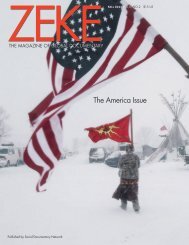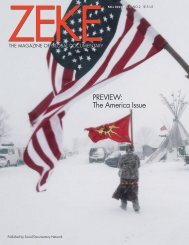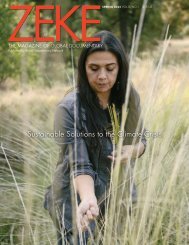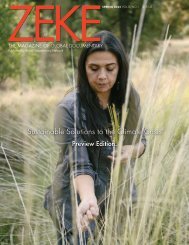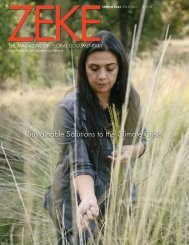ZEKE Fall 2019
Contents includes: "Youth of Belfast" by Toby Binder, and "Delta Hill Riders" by Rory Doyle, winners of ZEKE Award for Documentary Photography "Rising Tides" with photographs by Sean Gallagher, Lauren Owens Lambert, and Michael O. Snyder "Out of the Shadows: Shamed Teen Mothers of Rwanda" by Carol Allen Storey Interview with Lekgetho Makola, Head of Market Photo Workshop, South Africa, by Caterina Clerici "Why Good Pictures of Bad Things Matter" by Glenn Ruga Book Reviews and more...
Contents includes:
"Youth of Belfast" by Toby Binder, and "Delta Hill Riders" by Rory Doyle, winners of ZEKE Award for Documentary Photography
"Rising Tides" with photographs by Sean Gallagher, Lauren Owens Lambert, and Michael O. Snyder
"Out of the Shadows: Shamed Teen Mothers of Rwanda" by Carol Allen Storey
Interview with Lekgetho Makola, Head of Market Photo Workshop, South Africa, by Caterina Clerici
"Why Good Pictures of Bad Things Matter" by Glenn Ruga
Book Reviews and more...
- No tags were found...
Create successful ePaper yourself
Turn your PDF publications into a flip-book with our unique Google optimized e-Paper software.
esident of Reef Islands in the<br />
Solomon Islands. “Life in the<br />
coastal communities are more<br />
[reliant] on fishing and few on<br />
gardening,” he shared. But<br />
because of the water’s rising<br />
temperatures, the fish could<br />
hardly survive as hot water<br />
holds less oxygen. Add to that<br />
the fact that the current has<br />
become more confusing than<br />
ever, fishermen can no longer<br />
predict the best time to set<br />
sail. As a result, they spend<br />
more time in the sea than ever<br />
before. Coral reefs in Solomon<br />
Islands are also affected, and<br />
as corals die, the fish lose their<br />
breeding ground.<br />
In a 2010 study conducted<br />
by Nodua, it appeared that<br />
internal migration in Solomon<br />
Islands has increased in the past<br />
two decades. Residents from<br />
smaller islands such as Tikopia<br />
and Duff move to larger islands<br />
like Utupua, Santa Cruz, and<br />
Vanikoro. But even this is not a<br />
permanent solution. Nodua’s<br />
research revealed that the<br />
Solomon Islands has a much<br />
bigger problem — a problem<br />
shared by other nations like<br />
Marshall Islands, Kiribati, Tuvalu,<br />
and Maldives — coastal erosion.<br />
Dr. Engelhart has an explanation<br />
for this. He says, “when<br />
we talk about rising water levels,<br />
we use the term ‘relative sea<br />
level’ because we can change<br />
the level of the sea that people<br />
experience by either changing<br />
the volume/distribution of water<br />
or by changing the elevation<br />
of the land with respect to the<br />
ocean. Therefore, if the land is<br />
subsiding, sea level will rise in<br />
the eyes of an observer on that<br />
subsiding land even if the ocean<br />
volume isn’t changing.”<br />
And while most people think<br />
coastal erosion is simply caused<br />
by waves and tides washing<br />
away the land, Dr. Engelhart<br />
highlighted the role of tectonics,<br />
saying it’s one of the long-term<br />
processes that can alter the land<br />
level. “Earth’s tectonic plates<br />
moving past each other and<br />
getting stuck and then releasing<br />
make the land elevation change.<br />
These land-level changes can be<br />
slow and happen over hundreds<br />
to thousands of years but also<br />
can happen quickly where as<br />
much as a couple of meters<br />
elevation change can happen<br />
in seconds to minutes when a<br />
large earthquake occurs such as<br />
occurred in Sumatra in 2004 or<br />
Japan in 2011.”<br />
Health at Risk<br />
While conducting his study,<br />
Nodua found out that the<br />
climate crisis does have massive<br />
effects on food security.<br />
Residents of the Tuo village in<br />
Reef Islands have seen how the<br />
prolonged dry weather causes<br />
root crops and fruit trees to<br />
bear less. In late 2004 to early<br />
2005, Reef Islanders’ staple<br />
food ran low. The rising waters<br />
cause swamps to become more<br />
saline, making it difficult to<br />
grow swamp taro, a common<br />
food in most countries in<br />
Southeast Asia.<br />
As a domino effect, this<br />
problem further affects the<br />
health of islanders not only in<br />
Solomon Islands but coastal<br />
communities in Southeast Asia<br />
and globally. The challenge of<br />
harvesting fruits due to unstable<br />
weather patterns, and the<br />
decline of food sources puts<br />
children at risk of health and<br />
nutritional problems.<br />
Today, We Think. And<br />
Think Better.<br />
Islanders from different parts of<br />
the globe may have historically<br />
learned to embrace their<br />
environment. They may have<br />
learned how to understand<br />
the waters and everything it<br />
brings and takes. But now it<br />
seems the rising waters and the<br />
global climate have changed<br />
its language.<br />
Crosses and bones are<br />
being washed away, leaving<br />
people in Solomon Islands with<br />
no decent place to bury their<br />
dead. Nodua, who now works<br />
closely with Oceans Watch<br />
Solomon Islands, also found<br />
that the rising sea is affecting<br />
the access to fresh water in villages<br />
like Tuo; their well water<br />
started tasting saltier in the<br />
early 1990s.<br />
In the Philippines, the wives<br />
of fisherfolks have their own<br />
battle. Jenelyn Caro Quintalla<br />
comes from a family of 16. Her<br />
parents raised them all through<br />
fishing. Today, Jenelyn is a<br />
mother to six and her husband<br />
is also a fisherman. But as<br />
coastal road development eats<br />
through their community, and<br />
the waters continue to change<br />
temperature, Jenelyn sometimes<br />
finds herself wide awake at<br />
night. “It’s not easy. I feel like<br />
our life is in limbo. We can’t<br />
fish anymore so my husband<br />
works part-time at a construction<br />
site; budgeting is always a<br />
challenge,” she shared.<br />
RESOURCES<br />
Oceans Watch Solomon Islands<br />
www.oceanswatch.org/oceanswatchsolomon-islands<br />
Mother Nature Cambodia<br />
www.mothernaturecambodia.org<br />
Pacific Climate Warriors<br />
www.350pacific.org/pacific-climate-warriors<br />
Greenpeace<br />
www.greenpeace.org<br />
Pacific Community<br />
www.spc.int<br />
National Oceanic and<br />
Atmospheric Administration<br />
https://coast.noaa.gov<br />
<strong>ZEKE</strong> FALL <strong>2019</strong>/ 39









